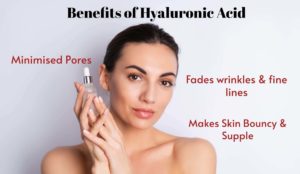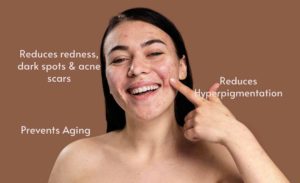If you’ve researched your skincare routine recently, you’ve found information regarding hyaluronic acid and niacinamide, two great chemicals. Both are often utilized in the most moisturizing regimens and while they are both associated with profound wetness, some differences make the chemicals unique from each other.
In this blog, we will be discussing the Niacinamide Vs Hyaluronic Acid benefits and usage of Niacinamide and Hyaluronic Acid.
What Exactly is Hyaluronic Acid?
Hyaluronic Acid is a glycosaminoglycan, a long polysaccharide carbohydrate formed of linked sugar molecules. It’s much easier to recall that it’s a clear, gooey, gel-like stuff. It can be found in the eyes, the joints, the skin, and the connective tissues.
Hyaluronic Acid has become famous in skincare for its ability to assist the skin to retain moisture. It also makes the skin appear smooth and full. Unfortunately, hyaluronic acid levels decline around the age of 40, resulting in dry skin and thinner skin. Hyaluronic Acid, on the other hand, can hold a thousand times its weight in water. That is why it is a renowned anti-aging skincare ingredient.
Benefits of Hyaluronic Acid

Hyaluronic Acid helps in retaining the moisture of the skin and hydrates the cells deep within. Here are some other benefits of using hyaluronic Acid.
1. It maintains appropriate skin hydration, making it appear bouncy and supple.
2. Reduces early signs of premature aging and fades out wrinkles and fine lines.
3. Minimizes pores and helps develop a healthy skin barrier.
Usage of Hyaluronic Acid
Hyaluronic Acid comes in different forms of moisturizers, serums, and cleansers. Regardless of what you are using, take into consideration that you are using a product that contains only 4% of hyaluronic Acid. Otherwise, it may dry out your skin.
In the form of serum. If you’re using a hyaluronic acid serum, apply it after cleansing and toning your skin. Apply a few drops of hyaluronic acid serum to your damp skin and gently rub it in. Please wait a moment for it to absorb before continuing with your skincare routine.
In the form of moisturizer. Follow your normal skincare routine and finish with your hyaluronic acid moisturizer. Use hyaluronic Acid twice a day to get the maximum benefit for your skin.
What is Niacinamide?
Niacinamide does not have the same effect as hyaluronic Acid. When we are talking about Niacinamide vs hyaluronic Acid, it is important to remember that Niacinamide is a vitamin, whereas hyaluronic Acid is a glycosaminoglycan. It is a water-soluble vitamin in the form of Vitamin B3. The human body does not produce this vitamin.
Niacinamide is utilized in many topical creams, serums, and cleansers in skincare since it is both gentle and effective.
Benefits of Niacinamide
Niacinamide is the all-rounder in the game of skincare. Hear all the benefits, and you will agree.

1. It provides enough hydration to the skin, which results in regular pH maintenance and normal sebum production.
2. Reduces the effect of hyperpigmentation.
3. Reduces redness, dullness, dark spots, and acne scars.
4. It also minimizes the effect of premature aging and smoothes out large pores.
Usage of Niacinamide
Niacinamide is widely used in the form of serum and must be applied on a freshly cleaned and dried face. After cleaning and toning, if you wish, apply your serum before heavier or oil-based serums, moisturizers, and sunscreen.
Niacinamide is water-based, and therefore, applying it over an oil-based serum will reduce its efficacy. You can use Niacinamide twice a day for effective benefits.
Niacinamide Vs Hyaluronic Acid
On paper, they appear to be pretty similar; both aid in hydration, are antioxidants, and possess anti-inflammatory qualities, yet they are not. Let’s only consider the top-line benefits of Niacinamide vs hyaluronic acid (HA). The former is an oil regulator that can aid with redness, while HA is primarily concerned with hydration.
Experts believe they are very different because Niacinamide is a type of vitamin B3, and hyaluronic Acid is a sugar molecule. HA is a potent hydrating product, but Niacinamide serves as more of an antioxidant with extra moisturizing effects.
Lastly – Can You Mix the Two?
Niacinamide promotes fatty acid production and reduces the loss of water in dry skin, while hyaluronic Acid is a substance that helps the skin retain moisture. The moisturizing benefits of these two substances complement each other, resulting in deeply moisturized skin. It is especially beneficial for persons who have dry, acne-prone, or aging skin.
When it comes to increasing hydration in your skin, hyaluronic Acid and Niacinamide work well together.
Niacinamide Vs Hyaluronic Acid FAQ-
Can I use Niacinamide on Oily Skin?
Absolutely! Hydration is also required for oily skin! In fact, a lack of hydrating agents or moisturizers will result in increased oil production, blockage of pores, and acne outbreaks.
What is the finest dry skin ingredient?
Niacinamide and Hyaluronic acid are the most effective substances for dry skin since they both help to moisturize the skin and keep it hydrated, preventing and combating dryness.
Who Is Niacinamide Suitable For?
Niacinamide can be utilized by anyone who wants their skin to be brightened, toned, and textured evenly.
Who Can Benefit from Hyaluronic Acid?
People who want healthy, soft, supple, and plump skin might utilize hyaluronic Acid regularly. It also keeps the skin moisturized, which prevents fine wrinkles.


Pingback: How To Achieve Korean Glass Skin? -Top Korean Beauty Secrets - Wild Oak Skincare
Pingback: Hyaluronic Acid for Dry Skin? Benefits, Side Effects & More- Wild Oak Skincare